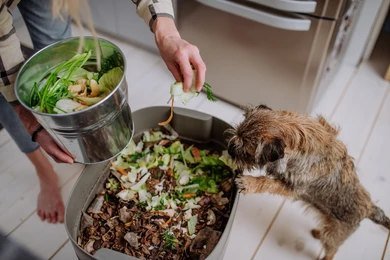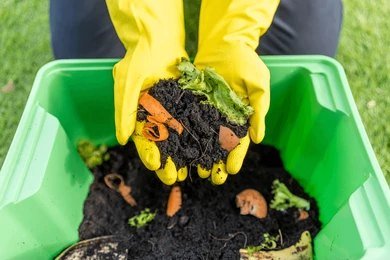The monsoons are almost here, bringing fresh air and lush vegetation. Gardening on these rainy days is cheerful and relaxing. However, it can pose a challenge for our precious treasure – compost bins.
But, don’t worry, our dear eco-warriors! The composting process is a pretty simple process if done correctly. If you’re already overwhelmed by the monsoon swinging by, then this article is for you. Read it through to know how you can keep your eco-bin thriving.
Composting is essential because it significantly reduces waste, turning biodegradable materials like food scraps and garden trimmings into nutrient-rich soil. Roughly, this practice helps a family of four cut their annual waste from 1000 kg to less than 100 kg.
By composting, soil health is improved. This promotes robust plant growth and decreases reliance on chemical fertilizers.
Composting helps reduce greenhouse gases because food waste in landfills produces methane, due to ineffective decomposition. Composting kitchen and vegetable waste instead of sending it to landfills minimizes methane emissions and reduces the burden on landfills, benefiting the environment.

Excess rainwater can cause compost bins to become waterlogged, leading to nutrient leaching. This washes away valuable nutrients, resulting in a soggy, nutrient-deficient compost that smells awful and slows down the decomposition process, making it less effective as a soil amendment.
Excessive moisture in the compost can lead to the growth of fungus. While some fungi are beneficial, an overgrowth can indicate too much moisture and can lead to unpleasant odors and a slimy texture.
High moisture levels can cause the compost to rot instead of properly decomposing. This results in a foul smell and an unhealthy compost pile that is less effective for soil enrichment.
Wet compost bins can attract pests such as flies, ants, and rodents. These pests are drawn to the damp environment and the decaying organic matter.
Excess moisture can compact the compost, reducing airflow. This lack of oxygen can slow down the decomposition process and produce a sour smell.
High humidity and moisture can lead to mold growth within the compost bin. Mold can be harmful to plants and humans if not managed properly.
The increased moisture and decreased aeration can affect the temperature of the compost pile, slowing down the microbial activity essential for decomposition.
By being mindful of these possible issues, composters can take the steps mentioned in the following sections to manage moisture levels and maintain a healthy compost pile during the monsoon season.

By using these tips and tricks, you can manage moisture levels and maintain a balanced compost bin during the rainy season, leading to happier and healthier composting.
Yes, monsoon is an excellent time for composting as increased moisture and warm temperatures speed up the process and create an ideal environment for microorganisms. However, it comes with challenges like excess moisture, waterlogging, and nutrient leaching, which can lead to foul smells and slow decomposition.
Using the tips as mentioned above like “raincoat composting” to protect your bin from rain and stockpiling dry materials to maintain carbon balance can help manage these problems. These strategies ensure effective composting by keeping moisture levels in check and promoting proper aeration.
For more such information related to gardening, composting, eco-friendly products, and more, join our community with Emera and check for our organic products and cleaning supplies here.
We hope to eradicate toxic ingredients from households by creating innovative, eco-friendly alternatives to everyday products